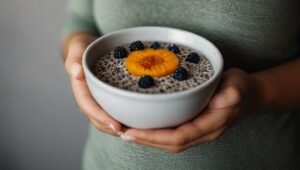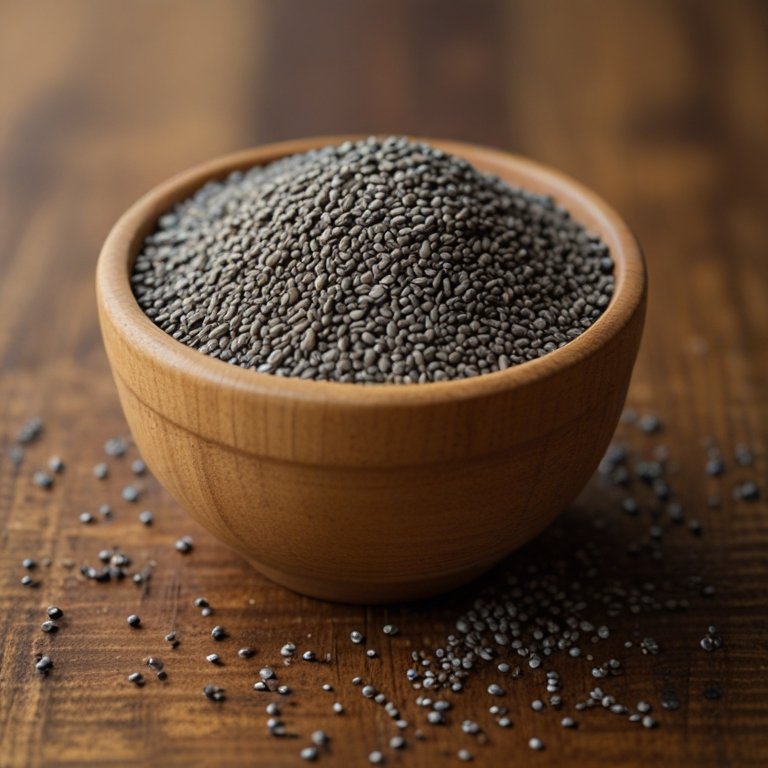In a fast-paced and sedentary life, a stomach full of fast food puts our hearts at great risk. When it comes to keeping our hearts healthy, chia seeds are like little superheroes, packed with omega-3 fatty acids. Though these seeds are small they have big benefits for our heart health, helping to protect against heart disease. Omega-3 fatty acids, like EPA and DHA, found in chia seeds, are like magic for our hearts.
From boosting energy levels to supporting heart health, these little seeds have got it all. I have diabetes. In my diabetic, and weight loss journey, I found chia very very helpful. Let’s have a look at chia seed health benefits.
Healthy Hair
Chia seeds are packed with omega-3 fatty acids, which are essential for maintaining a healthy scalp and promoting strong, shiny hair. These fatty acids help nourish hair follicles, reducing dryness and preventing breakage, resulting in luscious locks.
Kidney Health
The high fiber content in it supports kidney health by promoting regular bowel movements and aiding in the elimination of waste and toxins from the body. By keeping the digestive system running smoothly, chia seeds contribute to overall kidney function and health.
Diabetes Management
It have a low glycemic index, meaning they are digested and absorbed slowly, resulting in a gradual rise in blood sugar levels. This makes them a suitable option for individuals with diabetes, as they help stabilize blood sugar levels and prevent sudden spikes and crashes.
Relieves Constipation
They are rich in soluble fiber, which absorbs water and forms a gel-like substance in the digestive tract. This helps soften stool, promote bowel regularity, and alleviate constipation, making it easier to maintain digestive health.
Pregnancy Nutrition
During pregnancy, proper nutrition is crucial for the health and development of both the mother and the baby. Chia seeds are a nutrient-dense food rich in calcium, magnesium, and omega-3 fatty acids, which are essential for fetal growth and development. Including chia seeds in the diet can help ensure that both mother and baby receive the necessary nutrients for a healthy pregnancy.

Weight Loss
The combination of fiber and protein in those tiny-tiny seeds helps promote satiety and reduce appetite, making it easier to control food intake and manage weight. Additionally, chia seeds can absorb water and expand in the stomach, creating a feeling of fullness and reducing overall calorie consumption.
Belly Fat Loss
Some studies suggest that those seeds may have specific benefits for reducing belly fat. The soluble fiber in chia seeds helps regulate blood sugar levels and insulin sensitivity, which can contribute to a reduction in abdominal fat accumulation when combined with a healthy diet and regular exercise.
Healthy Skin
The omega-3 fatty acids in chia seeds help maintain the skin’s moisture barrier, preventing dryness and promoting overall skin health. Additionally, chia seeds contain antioxidants that help protect the skin from damage caused by free radicals, reducing signs of aging and keeping the skin looking youthful and radiant.
The benefits of chia seeds for animals:
Packed with nutrients like protein, fiber, and omega-3 fatty acids, they’re great for keeping animals healthy. These seeds help with digestion, keep coats shiny, and can even ease joint pain in older pets. Plus, they’re a natural energy source, perfect for active animals. Adding chia seeds to their diet can help manage weight, boost immunity, and keep them hydrated. They’re easy to use too – just sprinkle them on food or mix them into treats.
I think I have said a lot about chia benefits. Now surely want to know how to eat? I mean chia seed recipes.
Simple Drink
Put 2 tablespoons of chia seeds in 1 cup of water or your choice of liquid such as coconut water or fruit juice. Want some flavor then you can add a sweetener like honey or maple syrup, lemon or lime juice, fruit slices, or mint leaves. But if you are trying for weight loss then avoid sweetene.

Pudding
In a bowl or jar, combine chia seeds and milk. Stir well to mix. If desired, add sweetener and any other flavorings like vanilla extract or cocoa powder. Cover the bowl or jar and refrigerate for at least 2 hours or overnight, until the chia pudding thickens and sets. Once the pudding has set, give it a good stir and add your favorite toppings like fruit, nuts, or seeds. And it’s ready.
Breakfast Cookies
Mix 1 cup rolled oats, 1/2 cup almond butter, 1/4 cup maple syrup, and 2 tbsp chia seeds. Add coconut, dried fruit, and nuts as your choice. Mix well. Form cookies on a baking sheet and bake at 350°F (175°C) for 12-15 minutes. Cool and enjoy as a quick breakfast or snack!
Chia Seed and Berry Smoothie Bowl
Blend 1 ripe banana, 1/2 cup mixed berries, 1/4 cup almond milk or coconut water or milk, and chia seeds until smooth. Pour into a bowl and add toppings. Serve immediately for a refreshing and nutritious breakfast or snack!
Chia Seed Energy Bites
Blend 1 cup of dates, soaked and drained, 1/2 cup rolled oats, 1/4 cup cocoa powder, 2 tbsp chia seeds, and salt until sticky. Roll into balls and refrigerate until firm. Roll in coconut, nuts, or chocolate chips for extra flavor. Enjoy these tasty and energizing bites as a quick snack on the go!
If you are doubting, can we eat chia every day?
Yes, we can. But it can sometimes cause stomach discomfort like bloating or gas, especially if not soaked properly or consumed in large amounts. There’s also a risk of choking, so it’s crucial to soak them before eating or feeding them to pets.
Growing organic chia seeds at home is easier than you might think! Here’s a simple guide:
-
Choose Your Seeds
Start by selecting high-quality organic chia seeds from a reputable source. Look for seeds labeled as organic to ensure they haven’t been treated with synthetic pesticides or fertilizers.
-
Select a Growing Container:
You can grow chia seeds indoors or outdoors, depending on your preference and available space. Choose a shallow container with drainage holes to allow excess water to escape and prevent waterlogging.
-
Prepare the Soil:
Use a well-draining, nutrient-rich soil mix for optimal growth. If you’re growing chia seeds indoors, consider using a potting mix specifically formulated for indoor plants.
-
Plant the Seeds:
Scatter the chia seeds evenly across the surface of the soil, then lightly press them into the soil with your fingertips. Don’t bury the seeds too deep; they should be just barely covered with soil.
-
Water Regularly:
Keep the soil consistently moist but not waterlogged. Water the chia seeds gently using a watering can or spray bottle to avoid disturbing the seeds. Aim to keep the soil evenly moist until the seeds germinate and establish roots.
-
Provide Adequate Light:
Place the growing container in a location that receives plenty of sunlight, such as a sunny windowsill or balcony. Chia seeds require ample sunlight to thrive and grow into healthy plants.
-
Harvesting
Chia plants typically mature and produce seeds within 3-4 months of planting. Once the plants have reached maturity, you can harvest the seeds by gently rubbing the seed heads between your fingers to release the seeds. Collect the seeds in a bowl or container and store them in a cool, dry place until ready to use.
How to store?
First, dry them. To store organic chia seeds for eating, simply keep them in a dry, sealed container in a cool, dark place like your pantry. Make sure the lid is tight to keep air out. Check the expiry date occasionally, and use older seeds first. That’s all there is to it! Easy and hassle-free.
By following these easy steps, you can grow organic chia seeds at home and enjoy the satisfaction of harvesting your own nutritious superfood!

A 100-gram serving of chia seeds provides a wealth of nutrition, including:
– Calories: Approximately 486 kcal
– Protein: About 16.5 grams
– Fat: Around 30.7 grams (mostly heart-healthy unsaturated fats)
– Carbohydrates: Roughly 42.1 grams (mainly fiber)
– Fiber: A whopping 34.4 grams (supporting digestive health)
– Calcium: Approximately 631 milligrams (promoting bone health)
– Iron: About 7.7 milligrams (essential for oxygen transport in the body)
– Magnesium: Around 335 milligrams (important for muscle and nerve function)
– Phosphorus: Approximately 860 milligrams (contributing to bone health)
– Potassium: Roughly 407 milligrams (important for fluid balance and nerve transmission)
chia seeds are a nutritional powerhouse that can benefit your health in numerous ways. From supporting digestion and boosting energy levels to promoting heart health and aiding in weight management, these tiny seeds offer big rewards. So, why not start incorporating chia seeds into your diet today and experience the incredible benefits for yourself? Your body will thank you!

